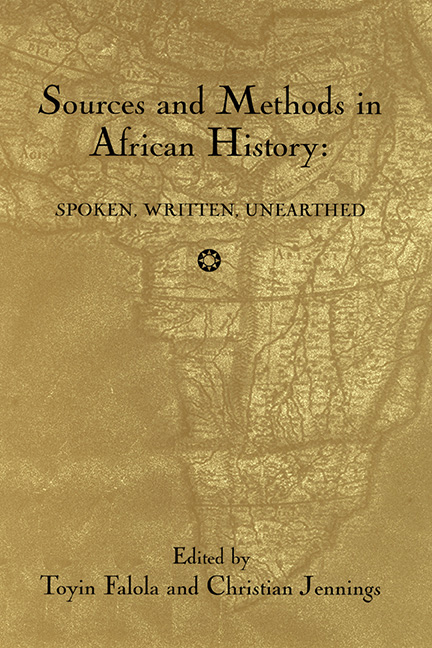Book contents
- Frontmatter
- Dedication
- Contents
- Acknowledgments
- Introduction
- Part I Archaeological Sources
- Part II Africa and the Atlantic World
- Part III Documentary Sources
- 10 Section Introduction: New Approaches to Documentary Sources
- 11 They Called Themselves Iloikop: Rethinking Pastoralist History in Nineteenth-Century East Africa
- 12 Interpreting Cases, Disentangling Disputes: Court Cases as a Source for Understanding Patron-Client Relationships in Early Colonial Lagos
- 13 Capricious Tyrants and Persecuted Subjects: Reading between the Lines of Missionary Records in Precolonial Northern Namibia
- Part IV Oral Tradition
- Part V Innovative Sources and Methods
- Contributors
- Index
12 - Interpreting Cases, Disentangling Disputes: Court Cases as a Source for Understanding Patron-Client Relationships in Early Colonial Lagos
from Part III - Documentary Sources
Published online by Cambridge University Press: 25 October 2017
- Frontmatter
- Dedication
- Contents
- Acknowledgments
- Introduction
- Part I Archaeological Sources
- Part II Africa and the Atlantic World
- Part III Documentary Sources
- 10 Section Introduction: New Approaches to Documentary Sources
- 11 They Called Themselves Iloikop: Rethinking Pastoralist History in Nineteenth-Century East Africa
- 12 Interpreting Cases, Disentangling Disputes: Court Cases as a Source for Understanding Patron-Client Relationships in Early Colonial Lagos
- 13 Capricious Tyrants and Persecuted Subjects: Reading between the Lines of Missionary Records in Precolonial Northern Namibia
- Part IV Oral Tradition
- Part V Innovative Sources and Methods
- Contributors
- Index
Summary
On 17 February 1879, a Lagosian named Jose sued another named Jinadu Somade in the Supreme Court of the British Colony of Lagos to recover possession of a house and land and establish title to them. Two months later, Jinadu Somade sued a man named Seidu Ebite in the same court to recover a debt of £106.13.6. A month after that, three men, Oruoloye, Abuduranomi, and Amore, sued Jinadu Somade to recover possession of the land at issue in the first case.
Max Gluckman taught us twenty-five years ago that in African societies, as elsewhere, overt legal conflict usually represents but a moment in an ongoing relationship among the participants. The antecedents of the three interrelated cases referred to here stretched back to 1862, when the British allowed the former-O. ba Kosoko, whom they had deposed and driven into exile a decade before, to return to Lagos. A man named Seidu Ebite accompanied Kosoko home. The sources reveal little about Seidu's origins, but judging from his lack of kin in Lagos and subsequent experiences, he was probably a slave belonging to Kosoko or a member of Kosoko's entourage. On reaching the colony, Ebite left Kosoko, taking advantage no doubt of the weakening of owners’ control over their slaves that immediately followed the British annexation. Seidu Ebite and another man, Jinadu Akiola, probably also a former slave, lived and traded together as “partners” for about a year.
In early colonial Lagos, as in Nigeria today, persons obtained access to resources, opportunities, and assistance through different kinds of relationships with men and women richer, more powerful, and better connected than they. By leaving Kosoko, Seidu Ebite undercut any claim to the help of the former O. ba or his close supporters. Evidently, Ebite and Jinadu Akiola found living and working on their own more difficult than they had expected, because at the end of their first year back in Lagos, they divided their profits and adopted the course of many other Lagos slaves who ran away from their owners. They constructed a patron-client relationship with a man, Jinadu Somade, whom they hoped would help and protect them, in return for labor and support. The three cases referred to here grew out of conflict between Seidu Ebite and his patron Jinadu Somade.
- Type
- Chapter
- Information
- Sources and Methods in African HistorySpoken Written Unearthed, pp. 195 - 218Publisher: Boydell & BrewerPrint publication year: 2003

